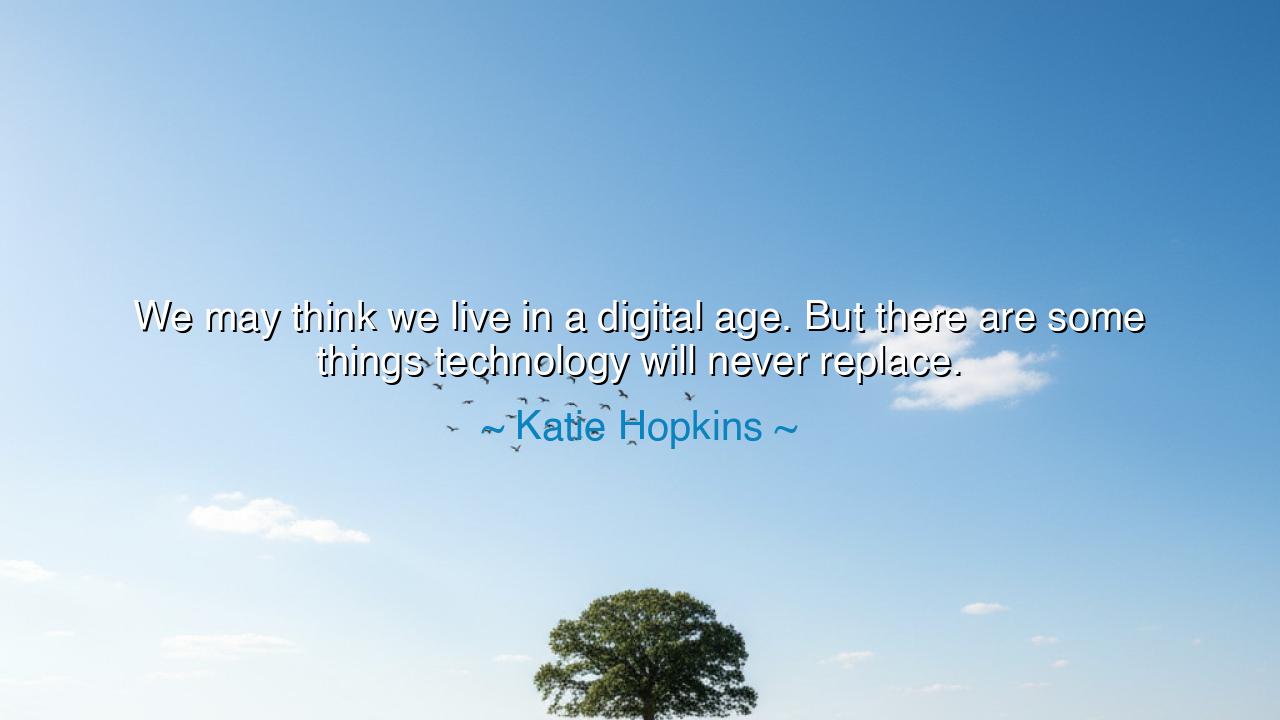
We may think we live in a digital age. But there are some things
We may think we live in a digital age. But there are some things technology will never replace.






The words of Katie Hopkins—“We may think we live in a digital age. But there are some things technology will never replace.”—sound like a bell tolling across the noise of modern life. In an era where every heartbeat seems synchronized to the rhythm of machines, her words strike as both a warning and a remembrance. She reminds us that though we may drape our existence in wires and screens, though our days pulse with data and devices, the essence of humanity remains beyond the reach of circuitry. The digital age may enhance our world, but it cannot define it. The human spirit—the laughter, the touch, the memory, the warmth of being alive—belongs to no machine.
Hopkins’s reflection arises from a world that has grown intoxicated with speed and connection, yet burdened by isolation. We have built towers of glass that reach into the sky, yet we struggle to look into one another’s eyes. We hold in our hands devices capable of summoning voices from across the earth, yet often forget to truly listen to the one beside us. Her words carry the echo of the ancients, who understood that wisdom cannot be coded, and that soul cannot be simulated. She warns that while technology may extend our reach, it must never replace our reach toward each other. For though we can digitize our faces, we cannot digitize our presence.
Consider the story of Helen Keller, born blind and deaf in an age long before the internet or artificial intelligence. Her world was dark and silent, yet through the human hand of her teacher, Anne Sullivan, light entered her life. The tapping of fingers into her palm—an act simple yet profoundly human—awakened her to the vastness of meaning. No screen, no algorithm, no artificial voice could have done what that human touch accomplished. Hopkins’s words remind us that it is precisely this—the intimate bridge between souls—that no technology, however advanced, will ever replace. Machines may teach us information, but only people teach us understanding.
When she speaks of the digital age, Hopkins is not condemning innovation. She acknowledges its power—the way it has reshaped medicine, education, communication, and art. Yet she urges us to remember that technology is a servant, not a master. The danger lies not in invention, but in inversion: when tools meant to serve humanity begin to define it. We may automate work, but we cannot automate empathy. We may store data in the cloud, but we cannot store love. The heart, unlike the computer, is not measured in bytes but in beats—and its wisdom is older than any machine could comprehend.
The ancients, though they knew no electricity, foresaw this dilemma in another form. In the myth of Prometheus, the titan steals fire from the gods to give to mankind—a symbol of progress and creation. But with that fire comes danger, for in wielding such power, humanity risks forgetting its limits. Technology is our modern fire. It can warm or it can consume, depending on how we tend it. Hopkins’s words are like Prometheus’s warning whispered to our age: Remember the source of your light. Do not mistake the flame for the soul that wields it.
There is also in her message a call to return to the sacred simplicity of being. For all our innovations, we still crave what no screen can provide: the smell of rain, the sound of laughter echoing through a crowded room, the feeling of a loved one’s hand resting in our own. These are the things that endure when the power fails, when the signal drops, when the noise of the world falls silent. They are the proof that life’s truest value cannot be downloaded or manufactured. They belong to the ancient realm of human experience, untouched by code and unending in beauty.
So let this teaching be carved into the hearts of all who hear it: embrace technology, but do not be enslaved by it. Let it be your tool, not your temple. Speak with your voice, not only your device. Look into faces, not only screens. Seek truth not from algorithms, but from wisdom, compassion, and reflection. For the day we forget these things will be the day we lose what it means to be human.
Thus, when Katie Hopkins reminds us that there are some things technology will never replace, she speaks not of nostalgia, but of preservation. She calls us to guard the flame of human connection, to nurture the art of presence, and to cherish the irreplaceable warmth of living souls. The digital age may advance forever—but the greatest progress will always lie in the heart that remembers what no machine can ever replicate: the power to love, to feel, and to be.






AAdministratorAdministrator
Welcome, honored guests. Please leave a comment, we will respond soon